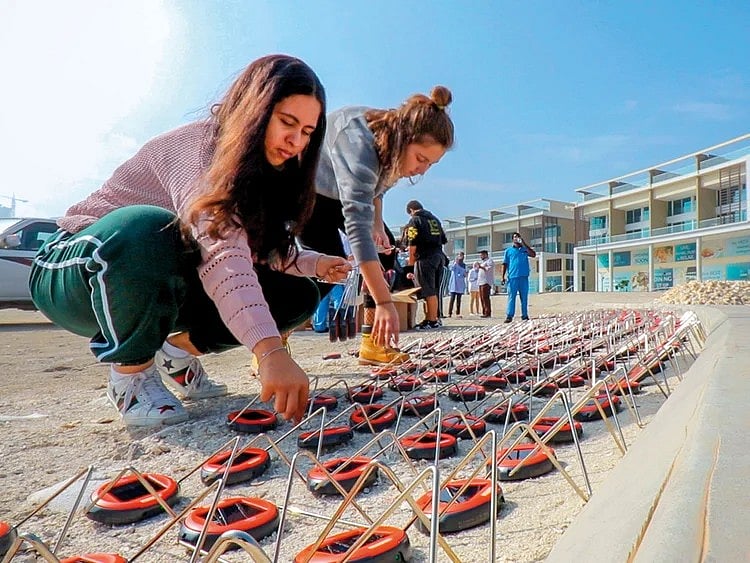UAE’s Jade Autism, Indian, Pakistani schools among Zayed Sustainability Prize finalists
33 finalists selected from 7,761 submissions spanning 173 countries

The UAE’s prestigious Zayed Sustainability Prize (ZSP) has announced the 33 finalists for its 2026 edition, selected from a record 7,761 submissions spanning 173 countries. The winners will be revealed at the awards ceremony on January 13, 2026, during Abu Dhabi Sustainability Week.
The finalists span six categories – Health, Food, Energy, Water, Climate Action and Global High Schools – with solutions tackling some of the world’s most urgent challenges, from AI diagnostics and aquaponics farming to solar-powered water purification and modular biogas systems. This marks a 30 per cent increase in submissions compared to last year.
UAE-based SME
Among this year’s standout finalists is Jade Autism, a UAE-based SME that has developed AI-driven and gamified cognitive tools to screen and support neurodiverse children. Already adopted in more than 450 institutions across 179 countries, the innovation represents the UAE’s growing role in global sustainability and inclusive technology. Jade Autism is the only UAE finalist among the 33 contenders and has been shortlisted in the health category.
Dr Sultan Ahmed Al Jaber, UAE Minister of Industry and Advanced Technology and Director General of the Prize, highlighted the transformative potential of this year’s finalists.
“From AI-enabled health diagnostics and circular food systems to disaster preparedness and climate resilience, they are harnessing technology, finance, and community leadership to deliver solutions that are affordable, reliable, scalable and generate socioeconomic value for the communities they serve. In doing so, they reflect the enduring legacy of Sheikh Zayed, whose vision of sustainable development and humanitarianism continues to inspire the UAE’s commitment to progress.”
Since its inception, the Prize has improved the lives of more than 400 million people worldwide – providing safe drinking water, renewable energy, nutritious food, and essential healthcare to underserved communities.
Health finalists: Drop Access (an SME from Kenya), Healthy Learners (an NPO from Zambia) and Jade Autism (an SME from the UAE).
Food finalists: E Green Global (an SME from South Korea), INMED South Africa (an NPO from South Africa) and N&E Innovations (an SME from Singapore).
Energy finalists: BASE Foundation (an NPO from Switzerland), GRST (an SME from China, Hong Kong) and Poder y Luz Maya (an NPO from Guatemala).
Water finalists: IRIBA Water Group (an SME from Rwanda), Stattus4 (an SME from Brazil) and the Great Bubble Barrier (an SME from the Netherlands).
Climate Action finalists: Build Up Nepal (an NPO from Nepal), CLIC RECYCLE (an SME from Spain) and GREE Energy (an SME from China, Hong Kong).
Global High Schools finalists
The finalists presented project-based, student-led sustainability solutions, coming from six different regions of the world. This year’s finalists include schools from India, Pakistan, the Philippines among others.
The Americas: Centro de Ensino Médio 111 - Recanto das Emas (Brazil), Escuela Secundaria Técnica 117 Guillermo González Camarena (Mexico) and Mamawi Atosketan Native School (Canada).
Sub-Saharan Africa: Likuni Boys Secondary School (Malawi), Kallamino Special High School (Ethiopia) and Kyanja High School, Mpigi (Uganda).
Middle East and North Africa: Fawakhir School for Applied Technology (Egypt), Al-Raja School for the Hearing Impaired (Jordan) and Rashaya High School (Lebanon).
Europe and Central Asia: Bodrum Anadolu High School (Türkiye), Specialized School in Angor (Uzbekistan) and Istedad Lyceum (Azerbaijan).
South Asia: Qadir Nagar High School (Pakistan), Faafu Atoll Education Center (Maldives) and Kikani Vidhya Mandir (India).
East Asia and Pacific: Camarines Norte Senior High School (The Philippines); True North International School (Vietnam); and Ruamrudee International School (Thailand).
Each winner in the Health, Food, Energy, Water, and Climate Action categories will receive $1 million, while each of the six winning Global High Schools will receive up to $150,000.
Ólafur Ragnar Grímsson, Chair of the Prize Jury and former President of Iceland, noted: “This year’s finalists reveal a powerful truth: sustainability is no longer a distant ambition, it is a lived reality shaped by communities, young people, and innovators across the globe.”
Sign up for the Daily Briefing
Get the latest news and updates straight to your inbox
Network Links
GN StoreDownload our app
© Al Nisr Publishing LLC 2026. All rights reserved.